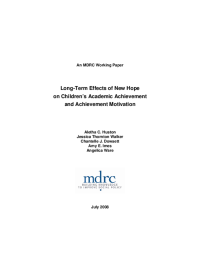Long-Term Effects of New Hope on Children’s Academic Achievement and Achievement Motivation
Conceived of in the late 1980s and implemented in 1994 in two inner-city areas in Milwaukee, Wisconsin, New Hope was an innovative program designed to address problems in the low-wage labor market. New Hope provided full-time workers with several benefits: an earnings supplement to raise their income above poverty, low-cost health insurance, and subsidized child care. For those unable to find full-time work, the program offered help in finding a job and referral to a wage-paying community service job when necessary. During the demonstration project, each of these benefits was available for up to three years.
This working paper examines the effects of New Hope on children’s academic achievement and achievement motivation eight years after random assignment (five years after the program ended) by comparing program-group and control-group children. Although New Hope’s effects on academic achievement evident in earlier years had faded by year eight, New Hope increased the extent to which children were making normal school progress and increased their engagement in school.







